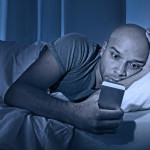By Bonnie Jenkins, Advanced Natural Wellness
Natural sedatives and sleep aids are high in demand for Americans. According the National Sleep Foundation, 67 percent of Americans are sleep-deprived or have sleep disorders. Since I normally log about five hours a night and suffer from periodic insomnia, I suppose you could count me in that statistic. Nights when I don’t get enough sleep leave me unproductive and rather grumpy the next morning. Not a pleasant way to start the day, but I always figure I can “catch up” on the weekend. Then I started thinking – could my poor sleep habits have a more sinister, long-term affect on my health?
That was the big question researchers at Boston’s Brigham and Women’s Hospital asked recently. After tracking the sleep habits of 71,000 women for ten years, the researchers found that the women who reported sleeping five hours or less a night were 45 percent more like to develop heart disease than those who slept for eight hours. Earlier studies have also found that people suffering from long-term insomnia have two-and-a-half times more car accidents than those who get their eight hours a night.
Set Your Internal Clock
MD Exposes the Hidden Danger to Your Eyes

When your eyesight starts to fail, it's a real problem. Suddenly you can't go to the grocery store... you can't get to the doctor if you have an emergency... you can't meet your friends for dinner…
Your "regular" doctor doesn't have time to keep up with the latest research. And the same goes for eye doctors. They go to school to learn how to fit you for glasses and contacts, but have no way of preventing the damage and loss of eyesight that threatens your freedom and independence.
Let me show you something that explains a LOT about how your eyes work.
In my FREE Special Report, I'll show you a HUGE, untapped resource for your eyes that safely and naturally restores clear, effortless eyesight.
Click here to get started...
Ok, so I needed more sleep – but that was easier said than done. Fortunately I came across a copy of “Restful Sleep,” a wonderful book by Deepak Chopra, M.D. In it, he addressed this very problem and offered some suggestions for developing good sleep habits. While Dr. Chopra cautions against using prescription sleeping pills that can be addictive and dangerous, he says that setting a regular bedtime, unwinding in a hot bath and making sure your bedroom is as dark as possible tells you body that it’s time to sleep.
If you’re still staring at the ceiling at 3:00 a.m., two supplements can help. Remember when you couldn’t sleep as a kid and Mom gave you a glass of warm milk? It turns out that she was on to something – the calcium in milk is a natural sedative that releases sleep-inducing tryptophan. But taking a calcium supplement is even better than drinking milk. Here’s why: according to Canadian researchers, the body eats up calcium as it goes through its sleep cycles. Taking 800 to 1,000 mg. of either coral calcium or calcium citrate before turning in helps your body maintain adequate calcium levels – and gives you a better night’s sleep in the bargain.
Some holistic practitioners prescribe melatonin supplements to naturally promote sleep. Melatonin regulates our internal clock but, as we age, we’re less able to produce this important hormone. If you’re sleepless and over 40, the standard recommendation is one to three mg. of melatonin thirty minutes before bedtime. But if you’re pregnant, have an autoimmune disorder, suffer from depression or have diabetes, the National Nutritional Food Association suggests seeking a doctor’s advice before using this remedy.
The Big Sleep
Are You Suffering From...
- Love handles and a pot belly
- Romance that isn't what it used to
- Forgetfulness and inattention
- Low (or no) strength and endurance
- A sex drive that's shifted into neutral...or worse
If so...you may have Mature Male Burnout. Click here to discover more about this unique condition and what you can do about it.
Herbs can help too. I’ve found that valerian (Valeriana officinalis) alleviates insomnia without leading to addiction or causing a morning hangover. In one placebo-controlled study of 128 people, 400 mg. of valerian enhanced sleep quality and significantly reduced the time it took to fall asleep. In another trial with 27 insomniacs, 89 percent reported that a valerian-based preparation improved their sleep – and 44 percent even boasted that they got “perfect sleep.”
Another sleep-inducing herb that master herbalist Althea Northage-Orr recently told me about is passionflower (Passiflora incarnata). According to Althea, drinking a cup of passionflower tea an hour or two before bedtime is a wonderful way to settle edgy nerves. And apparently its benefits don’t stop there. A double-blind randomized trial of 36 patients found that passionflower also soothes tense muscles and restlessness.
Kava (Piper methysticum) can also have a calming effect on stress-induced insomnia. In a month-long study, 58 patients were randomly assigned to receive either a placebo or a standardized kava extract. After a week, those taking the dummy pill hadn’t noticed any difference. But the kava group reported a significant improvement in anxiety and tension. Although kava has been demonized by the press lately, clinical trials haven’t reported any negative side effects when this herb is used on an occasional or short-term basis.
One Last Thing …
Aromatherapy is a great sleep aid if you suffer from mild insomnia. Studies show that sniffing lavender or jasmine essential oils can help you nod off and promote more restful sleep. In one small study, researchers found that geriatric patients slept better in an aromatherapy-scented room than they did after taking synthetic drugs. To try this gentle remedy, put three to five drops of either essential oil in a diffuser near your bed and breathe deeply.
It’s wonderful to discover safe, effective alternatives to help us get a good night sleep. The next time insomnia strikes, I suggest that you try one of these natural remedies. Like me, you may find that your sleep problems are just a distant dream.
References:
Akhondzadeh S, et al. “Passionflower in the treatment of generalized anxiety: a pilot double-blind randomized controlled trial with oxazepam.” Journal of Clinical Pharmacological Therapy. 2001; 26: 363-367.
Cagnacci A, et al. “Kava-Kava administration reduces anxiety in perimenopausal women.” Maturitas. 2003; 44: 103-109.
Leathwood PD, et al. “Aqueous extract of valerian root (Valeriana officinalis L.) improves sleep quality in men.” Pharmacology, Biochemistry and Behavior. 1982; 17: 65-71






